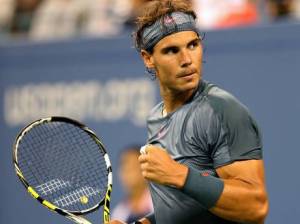Last week, I wrote about why good leaders are great coaches. This week, a focus on sales with a simple question: do the most talented always win? (No). And can I beat them? (Yes, yes, yes – planning and objectives).
Will the naturally gifted always beat the prepared? This is my take on the innate versus implementation debate.
Ask yourself: do you really believe that off-the-cuff ability triumphs over structured plan? If you do – and have you seen Dimitar Berbatov (sublimely capable, infuriatingly unbothered)? – please read on. Hopefully I can change your mind.
And if you don’t believe it… if, like me, you believe that planning and practice trump talent, then ask yourself a different question: are you still wasting time complaining about ‘better’ sales people?
Enough questions. Let’s take a quick look at an excellent tennis player: Rafael Nadal.
Roger Federer is commonly regarded as the greatest tennis player of all time; the greatest shot maker with the most trophies. His nine-year rivalry with Nadal is one of the sports greatest. And Nadal leads it 21 games to ten.
Nadal has beaten Federer twice as many times as Federer has beaten Nadal. Why? I believe it’s his shot production and clarity of objectives.
You might not know #1: even though Nadal plays tennis left handed, he is right handed. His uncle and coach told him to play with his left hand – despite the huge difficulty young Rafa must have experienced when he first started playing – because of the advantage that lefties enjoy against right-handers. It’s not how you play; it’s how the two play against each other.
You might not know #2: Nadal hits the ball with a greater margin for error than Federer (and Djokovic, for that matter). Lots of topspin allows the ball to clear the net higher and then dip in court. When players are getting tense and key points are up for grabs, Nadal can reproduce his game more easily.
You might not know #3: Nadal towels down after every point (players used to towel down at the change over only). He uses this time to re-focus and reaffirm his objectives.
What does this mean for sales?
1. Think about the two of you: buyer and seller. Do you know everything about them? Is that information easily available to you? Is it on your desk now?
2. Have a skill set and a technique that you can implement in every situation. Sales is a developable, improveable professional skill. It is not just talent.
3. Plan your approach. Make it clear (clarity is fundamental for me) and keep it visible. Is it on your desk with the prospect info? Refer to your objectives continually or you will lose both momentum and the initiative. Remember: Nadal refocuses after every point.
In 20 years of running my own company, I have met many people who believe a winning performance in business, in sport, in parenthood, in whatever, is only achievable by those with natural-born talent. They are wrong. Winners practice, plan and implement, and they have clear objectives.
Sport and sales have many parallels, but there are some key differences. A career in business can last significantly longer. Which means that planning and objectives are even more important!
P.S. I showed this blog to a colleague who reminded me of this quote: “Amateurs practice until they do it right. Professionals practice until they can’t possibly do it wrong.” I can’t find a source, but whoever said it knew what they were talking about.

